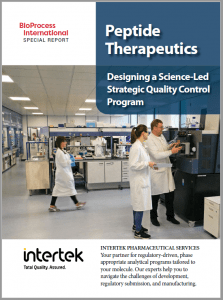 Peptide therapeutics are a unique class of pharmaceuticals. They can fall into one or more regulatory categories: as conventional chemical molecules, biological entities, or biosimilars. Developing a well–thought-out quality control (QC) strategy is key to meeting development milestones and complying with evolving regulatory requirements. Safety assessment is critical because slight changes in the structure, physicochemical properties, stability, and impurity profile of a peptide can provoke an adverse immune response. A robust analytical QC program should be conducted in laboratories that comply with good manufacturing practices (GMPs) to help establish and meet specifications, supporting regulatory submissions. These programs should be tailored to a peptide of interest to ensure precision, selectivity, and confidence in the results generated. A careful selection of techniques is key. This Special Report introduces the regulatory and scientific considerations for peptide development and key analytical approaches for biophysical characterization, higher-order structure, aggregation, disulfide-bond analysis, and product-related impurity analysis, which are required as part of a robust peptide QC program.
Peptide therapeutics are a unique class of pharmaceuticals. They can fall into one or more regulatory categories: as conventional chemical molecules, biological entities, or biosimilars. Developing a well–thought-out quality control (QC) strategy is key to meeting development milestones and complying with evolving regulatory requirements. Safety assessment is critical because slight changes in the structure, physicochemical properties, stability, and impurity profile of a peptide can provoke an adverse immune response. A robust analytical QC program should be conducted in laboratories that comply with good manufacturing practices (GMPs) to help establish and meet specifications, supporting regulatory submissions. These programs should be tailored to a peptide of interest to ensure precision, selectivity, and confidence in the results generated. A careful selection of techniques is key. This Special Report introduces the regulatory and scientific considerations for peptide development and key analytical approaches for biophysical characterization, higher-order structure, aggregation, disulfide-bond analysis, and product-related impurity analysis, which are required as part of a robust peptide QC program.
Fill out the form below to read the complete report and learn more about quality control programs for peptide therapeutics now.
